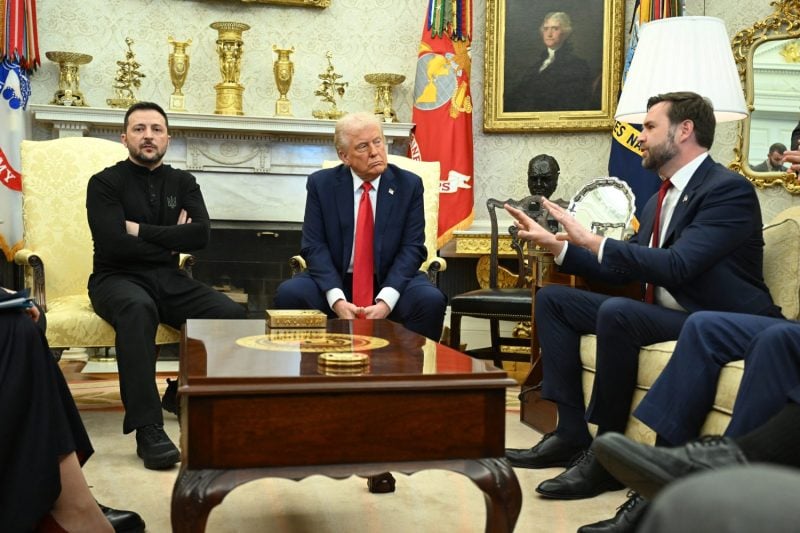Don’t Offshore American AI to the Middle East

Don’t Offshore American AI to the Middle East
After freeing itself from a dependence on the region’s oil, the United States should not sign up for the same with AI.
Mario Tama/Getty Images
In 1867, Tsar Alexander II of Russia agreed to sell the territory of Alaska to the United States for a mere $7.2 million—approximately 2 cents per acre. At the time, Secretary of State William Seward, the architect of the deal, was ridiculed for the acquisition; critics called it “Seward’s Folly.” But since geologists struck oil in the region in 1902, Alaska has provided the United States with a strategic resource that helped bankroll its rise over the 20th century.
Alaskan oil production has generated more than $180 billion in revenue for the state—a return orders of magnitude greater than the original purchase price. Meanwhile, Russia’s Alaska sale has gone down as a strategic blunder.
In 1867, Tsar Alexander II of Russia agreed to sell the territory of Alaska to the United States for a mere $7.2 million—approximately 2 cents per acre. At the time, Secretary of State William Seward, the architect of the deal, was ridiculed for the acquisition; critics called it “Seward’s Folly.” But since geologists struck oil in the region in 1902, Alaska has provided the United States with a strategic resource that helped bankroll its rise over the 20th century.
Alaskan oil production has generated more than $180 billion in revenue for the state—a return orders of magnitude greater than the original purchase price. Meanwhile, Russia’s Alaska sale has gone down as a strategic blunder.
Today, Washington risks making a similar error. Ahead of President Donald Trump’s visit to the Persian Gulf, his administration is considering approving the export of hundreds of thousands, or even millions, of advanced artificial intelligence chips to Saudi Arabia and the United Arab Emirates. These chips are essential to training and deploying cutting-edge AI systems that may soon bring breakthroughs in fundamental science and transform the face of economic and military competition worldwide.
Approving more limited chip sales—especially to Gulf data centers operated by U.S. tech companies—poses fewer risks. But when companies in the United States are struggling to source enough AI computing power for their operations at home, the chips are worth more than the Gulf seems to be offering.
If—lured by the promise of cheap energy and Gulf capital—the Trump administration greenlights unlimited chip exports, then it will be placing the most important technology of the 21st century at the whims of autocratic regimes with sophisticated surveillance systems, expanding ties to China, and interests very far from those of the United States.
It’s no secret why the Gulf states are so eager for computing power: They have stratospheric ambitions in AI. Saudi Arabia has latched on to the technology as the economic model of the future, one that can replace its reliance on oil exports. The UAE’s national security advisor, Sheikh Tahnoon bin Zayed Al Nahyan, also chairs G42, the country’s leading AI company, and controls $1.5 trillion in sovereign wealth funds. He is reportedly a “true believer” in the near-term possibility of artificial general intelligence—the idea that AI systems will soon match or exceed human performance in every task.
G42 has negotiated access to Microsoft’s AI services; MGX, a UAE investment fund, is backing OpenAI’s Stargate project, which aims to build computing infrastructure in the United States; and Emirati leaders have encouraged Samsung and Taiwan Semiconductor Manufacturing Co. to build advanced chip factories in the country.
Both states now have their sights set on building vast new AI data centers in the desert, filled with hundreds of thousands of the most advanced Nvidia chips, so they can develop and run world-leading AI models. The result would be not only profit, but also systems that could turbocharge these countries’ surveillance and cyber capabilities—and that may be essential to military advantage in the next decade.
Gulf states certainly have the money and energy to realize their AI plans. All they need are the chips. So ever since late 2023, when the Biden administration shut off exports of those chips to the Gulf over bipartisan concerns about Saudi and Emirati links to China, the region’s leaders have pleaded with U.S. officials to turn the taps back on. The Biden administration allowed some chips to flow to the region, but a broader deal remained elusive, and the administration was divided internally over the benefits of partnering with authoritarian countries on AI.
Those risks haven’t gone away, however enticing the Trump administration might find the prospect of greater access to Gulf investment and energy for U.S. tech companies. Under U.S. pressure, the United Arab Emirates, in particular, has made some moves to distance itself from Beijing. G42 has divested from some Chinese firms and ripped out Huawei technology as part of a deal with Microsoft.
But China remains the UAE’s top nonoil trading partner; Chinese and Emirati air forces have held joint exercises in Xinjiang; and China did not protest G42’s decision to sever ties with Huawei in 2023—a revealing silence, given China’s usual reaction when other countries decide to shun Chinese tech. Sheikh Tahnoon himself has cultivated deep connections with Beijing, and diplomats from both countries continue to speak of a golden age in their bilateral relationship.
Saudi Arabia may be an even less reliable partner for the United States on AI. China is Saudi Arabia’s top trading partner and the largest buyer of its oil. The country has joined the Shanghai Cooperation Organization, a China-led security partnership in Central Asia, as a dialogue partner. Saudi Arabia also has extensive political and economic ties with Russia, which remains indispensable to Saudi efforts to keep oil prices high. In the wake of Russia’s full-scale invasion of Ukraine, Riyadh only strengthened its relationship with the Kremlin.
The risk that some of the United States’ most sensitive intellectual property could leak to U.S. adversaries—or that those adversaries could access U.S. AI systems in the Gulf to enhance their surveillance and military capabilities—remains very real. And both the UAE and Saudi Arabia have a disturbing habit of spying on U.S. citizens. U.S. officials should recognize that no level of access to U.S. technology or investment will make these countries fully trustworthy partners. Accelerating the Gulf’s AI ambitions could also inadvertently erode Israel’s military advantage in the region, something that the United States has long committed itself to maintaining.
Fortunately, the United States needn’t rush to sign a deal. Although some advocates for a close AI partnership with the Gulf argue that the United States needs foreign energy to power the AI data center boom, those worries are overblown. Much of the problem is regulatory: If state and federal regulators unlock the permitting process, something this administration is already working hard on, then companies will find ways to build in the United States. And even if domestic projects remain gummed up, AI companies can find abundant energy from far more reliable U.S. allies, such as Australia, Canada, Finland, and Norway.
If anything, a Gulf deal would hurt U.S. AI developers: Every major AI company is racing to buy every chip it can find. Selling more to Gulf companies will only take them out of the hands of U.S. businesses. Even if Washington authorizes sales only to U.S. companies building data centers in the region, it risks creating a race to the bottom in which every AI developer feels pressure to exploit cheap Gulf energy and capital to compete. This will accelerate the offshoring of an industry that the administration has pledged to build in America.
Nor is there a significantly better offer available for the Gulf from Beijing: For all China’s technological progress, it cannot yet produce enough advanced AI chips to satisfy its domestic demand, let alone export at scale. For now, Washington has the leverage to drive a hard bargain.
A hard bargain does not mean no bargain. The UAE and Saudi Arabia remain valuable economic and diplomatic partners—ones the United States should not alienate unnecessarily. A smart deal would allow U.S. tech companies to build some data centers in partnership with local companies such as G42. But it would bar them from offshoring their largest, most sophisticated operations and make sure that Emirati tech companies can only access enough chips to train models a generation behind the state of the art.
In exchange for access to U.S. chips, Washington should push the Gulf to cut off investment in China’s AI and semiconductor sectors and safeguard exported U.S. technology. The United States has already moved to bar U.S. investors from financing these sectors in China; allowing Gulf states to do so instead, while handing them U.S. technology, would put American investors at a stark disadvantage.
Billions of dollars from Gulf sovereign wealth funds, moreover, would do a lot to help China catch up to the United States. Washington should also work to keep U.S. technology secure by pushing the UAE and Saudi Arabia to develop their own export control laws, segregate American from Chinese tech, and give U.S. companies and officials the access necessary to verify how and where U.S. systems are being used.
A bargain along those lines would be worth doing. Anything less would be a giveaway that the administration would come to regret. For half a century, the United States has struggled to free itself from its dependence on Middle Eastern oil—a vulnerability that has distorted U.S. foreign policy and forced one president after another to cater to the wishes of a string of brutal and corrupt Middle Eastern dictators.
If the United States offshores the infrastructure that underpins the world’s most advanced AI systems to the Gulf, it risks creating another dependency that could last just as long and be just as destructive.
Alasdair Phillips-Robins is a fellow at the Carnegie Endowment for International Peace. He served as a senior policy advisor to the U.S. secretary of commerce from 2023-2025.
Sam Winter-Levy is a fellow at the Carnegie Endowment for International Peace. X: @SamWinterLevy
More from Foreign Policy
-

Eight people dressed in camouflage military combat uniforms wade across a river, the water up to their waists. The soldiers carry large backpacks along with their rifles. Snowcapped mountains and a thick forest of evergreen trees loom in the distance. Get Ready for the Aleutian Island Crisis
As conflict heats up in the Arctic, foreign adversaries eye Alaskan territory.
-

U.S. President Donald Trump speaks to reporters before boarding Air Force One at Morristown Municipal Airport in Morristown, New Jersey, on April 27. Trump’s First 100 Days Reveal a ‘Strongman’s’ Unprecedented Weakness
No U.S. president has ever surrendered global power so quickly.
-

An elderly man and woman sit on the ground, the man on his knees as he sorts through something on the ground. Behind him are a rusted cart and bicycle in front of a paint-smeared concrete wall and a battered corrugated metal sign with the words USAID: From the American people” on it. What Trump’s New Budget Says About U.S. Foreign Policy
The president wants to significantly pull back on many of America’s traditional global engagements while spending more on the border and defense.
-

U.S. President Donald Trump listens to Secretary of State Marco Rubio at a cabinet meeting in the White House in Washington, D.C. Rubio’s Reorganization Plan Is a Wrecking Ball
The State Department revamp goes far beyond streamlining—it will devalue human rights and strip away critical expertise.










Join the Conversation
Commenting on this and other recent articles is just one benefit of a Foreign Policy subscription.
Already a subscriber?
.
Subscribe
Subscribe
View Comments
Join the Conversation
Join the conversation on this and other recent Foreign Policy articles when you subscribe now.
Subscribe
Subscribe
Not your account?
View Comments
Join the Conversation
Please follow our comment guidelines, stay on topic, and be civil, courteous, and respectful of others’ beliefs.
Change your username |
Log out
Change your username:
CANCEL
Confirm your username to get started.
The default username below has been generated using the first name and last initial on your FP subscriber account. Usernames may be updated at any time and must not contain inappropriate or offensive language.